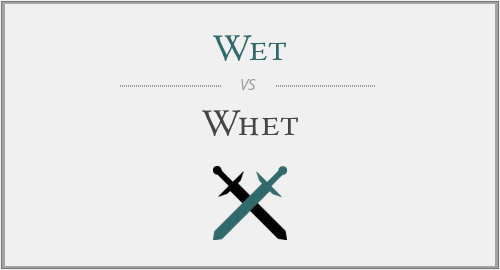He put on a wet bathing suit.
The aroma whet my appetite.
Are you wondering whether its “whet your whistle” and “wet your appetite,”? Neither is correct. Most people’s lips don’t need to be any sharper, and appetites aren’t aroused by giving them a good soaking. Here’s how to keep wet and whet in their proper places.
Origin:
Wet originated from Old English wǣt (adjective and noun), wǣtan (verb); related to water.
Wet as adjective:
When something is covered or saturated with water or another liquid is called wet.
She followed, slipping on the wet rock.
Wet also means showing a lack of forcefulness or strength of character; feeble.
They thought the cadets were a bit wet.
Wet as verb:
Wet is used as a verb in English language which means to cover or touch with liquid; moisten.
He wetted a finger and flicked through the pages.
Wet as noun:
Wet is also a noun which means a liquid that makes something damp.
I could feel the wet of his tears.

Whet as verb:
Whet is used as a verb which means to sharpen the blade of (a tool or weapon).
She took out her dagger and began to whet its blade in even, rhythmic strokes.
To excite or stimulate (someone's desire, interest, or appetite) is also called whet.
Here's an extract to whet your appetite.
Whet as noun:
A thing that stimulates appetite or desire is also called whet.
He swallowed his two dozen oysters as a whet.
Examples:
Here are some images of the freshly painted wall to whet your appetite for the 2011 season. [SFist]
The campaign to whet the public’s appetite for the clothes began in September during New York Fashion Week. [Sydney Morning Herald]
Like any good overture, the work served to whet the audience’s palette and raise excitement for what was to come. [Daily Breeze]
Just when you’d thought you’d be able to wet your whistle on Sunday, a Republican caucus killed a measure to allow the sale of alcohol on Sundays last week. [Walton Tribune]
Wet or whet:
Wet is (1) an adjective meaning covered or soaked in liquid, and (2) a verb meaning to make wet. Whet is a verb meaning to sharpen or to stimulate. The latter has origins in Old English, where it related to sharpness and sharpening, but in modern usage it’s confined almost exclusively to the phrase whet [one’s] appetite. Because it’s more or less forgotten outside this phrase, whet is easy to confuse with the far more common wet.




Have a discussion about this article with the community:
Report Comment
We're doing our best to make sure our content is useful, accurate and safe.
If by any chance you spot an inappropriate comment while navigating through our website please use this form to let us know, and we'll take care of it shortly.
Attachment
You need to be logged in to favorite.
Log In